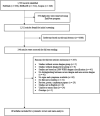Clinical signs and symptoms associated with WHO severe dengue classification: a systematic review and meta-analysis
- PMID: 34036893
- PMCID: PMC8205005
- DOI: 10.1080/22221751.2021.1935327
Clinical signs and symptoms associated with WHO severe dengue classification: a systematic review and meta-analysis
Abstract
ABSTRACTThe World Health Organization (WHO) introduced the new dengue classification in 2009. We aimed to assess the association of clinical signs and symptoms with WHO severe dengue classification in clinical practice. A systematic literature search was performed using the databases of PubMed, Embase, and Scopus between 2009 and 2018 according to PRISMA guideline. Meta-analysis was performed with the RevMan software. A random or fixed-effect model was applied to pool odds ratios and 95% confidence intervals of important signs and symptoms across studies. Thirty nine articles from 1790 records were included in this review. In our meta-analysis, signs and symptoms associated with higher risk of severe dengue were comorbidity, vomiting, persistent vomiting, abdominal pain or tenderness, pleural effusion, ascites, epistaxis, gum bleeding, GI bleeding, skin bleeding, lethargy or restlessness, hepatomegaly (>2 cm), increased HCT with decreased platelets, shock, dyspnea, impaired consciousness, thrombocytopenia, elevated AST and ALT, gall bladder wall thickening and secondary infection. This review shows new factors comorbidity, epistaxis, GI and skin bleeding, dyspnea, gall bladder wall thickening and secondary infection may be useful to refine the 2009 classification to triage severe dengue patients.
Keywords: Severe dengue; meta-analysis; predictive performance; signs; symptoms.
Conflict of interest statement
No potential conflict of interest was reported by the author(s).
Figures
References
-
- World Health Organization . Dengue guidelines for diagnosis, treatment, prevention and control. Geneva: WHO Press; 2009; Available from: https://www.who.int/tdr/publications/documents/dengue-diagnosis.pdf. - PubMed
Publication types
MeSH terms
LinkOut - more resources
Full Text Sources
Other Literature Sources



